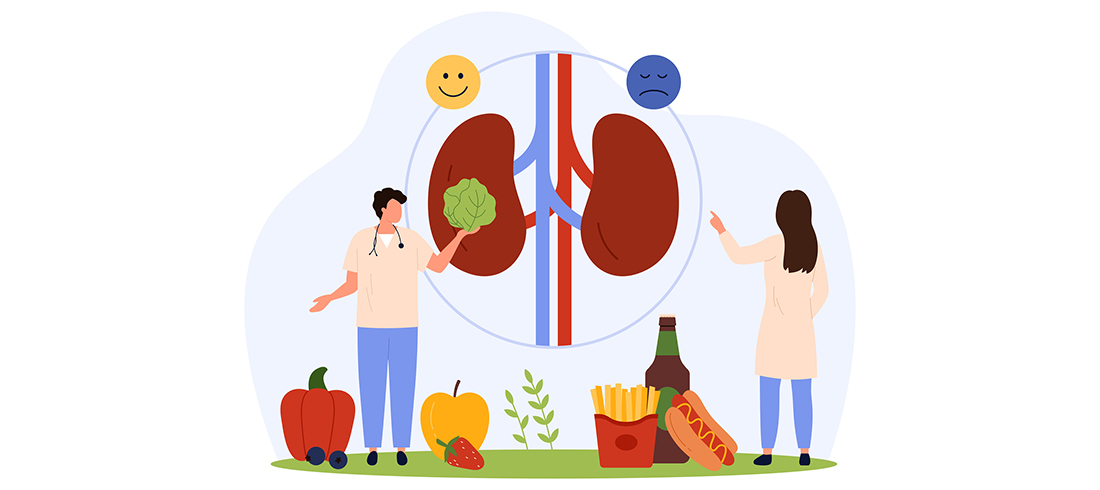March marks not only National Nutrition Month but also National Kidney Month*, making it the perfect time to explore the vital link between diet and kidney health. Our kidneys play a crucial role in filtering waste products from the blood and regulating fluid balance in the body. Maintaining optimal kidney function is essential for overall health and well-being, and one of the most effective ways to support kidney health is through a balanced diet.
Importance of a Balanced Diet for Kidney Health
A balanced diet provides the essential nutrients our bodies need to function properly. When it comes to kidney health, maintaining a balanced diet helps reduce the risk of developing kidney stones, kidney disease, and other related complications**. The foods and beverages you consume play a crucial role in assisting your kidneys in maintaining a healthy equilibrium of salts and minerals in your body, ultimately contributing to your overall well-being.
Foods to Avoid for Kidney Health
Certain foods and beverages can strain the kidneys and worsen kidney function. Dietary needs can vary depending on the health of a person’s kidneys, but in general, individuals with kidney issues or those looking to maintain optimal kidney health should limit or avoid the following:
- High-Sodium Foods: Excessive sodium intake can increase blood pressure and put a strain on the kidneys. Processed foods, canned soups, fast food, and salty snacks are examples of high-sodium foods to avoid.
- Processed Meats: Processed meats contain high levels of sodium and phosphorus, both of which can be harmful to kidney health. Examples of processed meats you should limit or avoid altogether include deli meats, bacon, sausage, and hot dogs.
- Sugary Foods and Beverages: Consuming too much sugar can contribute to obesity and diabetes, both of which are risk factors for kidney disease. Limiting sugary snacks, desserts, and sweetened beverages is essential for kidney health.
- High-Phosphorus Foods: Foods rich in phosphorus, such as dairy products, nuts, seeds, and whole grains, should be consumed in moderation by individuals with kidney disease, as high phosphorus levels can lead to bone and heart problems.
Best Foods for Kidney Health
Incorporating kidney-friendly foods into your diet can help support optimal kidney function and overall health. Some of the best foods to eat for kidney health include:
- Fresh Fruits and Vegetables: Fruits and vegetables are excellent sources of essential vitamins, minerals, and antioxidants. They are also low in sodium and can help reduce inflammation and support kidney function.
- Lean Protein Sources: Opt for lean protein sources such as fish, poultry, tofu, and legumes instead of red meat. These protein sources are lower in phosphorus and saturated fat, making them ideal choices for kidney health.
- Whole Grains: Whole grains like brown rice, quinoa, oats, and whole wheat provide fiber, vitamins, and minerals without contributing to high phosphorus levels.
- Healthy Fats: Incorporate healthy fats from sources like avocados, olive oil, nuts, and seeds into your diet. These fats can help reduce inflammation and support heart health, which is crucial for individuals with kidney disease.
Foods to Consult Your Doctor About
While it’s important to talk to your doctor about all nutritional decisions, especially if you have concerns about your kidney health, there are some foods and nutritional habits, in particular, you should keep on your radar if you have chronic or advanced kidney disease.
- High-Potassium Foods: Chronic Kidney Disease (CKD) can make it difficult for the kidneys to remove potassium from the blood. Levels that are consistently too low or too high can cause muscle and heart issues for some patients with poor kidney health. If you have CKD, talk to your Premier Medical physician about getting regular blood screenings to monitor your potassium levels. If your levels are high, it might be necessary to modify your diet to also limit potassium.
- Liquid Consumption: People with advanced kidney disease might need to track the amount of liquids they consume since it can be difficult for the kidneys to remove excess fluid. Consuming too many fluids can lead to swelling, elevate your blood pressure, and impose greater strain on your heart. If you have chronic or advanced kidney disease, consult your Premier Medical physician about tracking your liquid intake.
As we commemorate National Nutrition Month and National Kidney Month, let’s recognize the significant impact that diet can have on kidney health. By adopting a balanced diet that includes kidney-friendly foods and limits or avoids foods that strain the kidneys, individuals can take proactive steps toward maintaining optimal kidney function and overall well-being. Remember, small dietary changes can make a big difference in supporting kidney health for years to come.
If you have more questions or concerns about your kidney health, please contact Premier’s Internal Medicine division with offices in Poughkeepsie, Fishkill, New Windsor, and Newburgh to schedule an appointment today.
*https://www.premiermedicalhv.com/news/celebrate-national-kidney-month/

